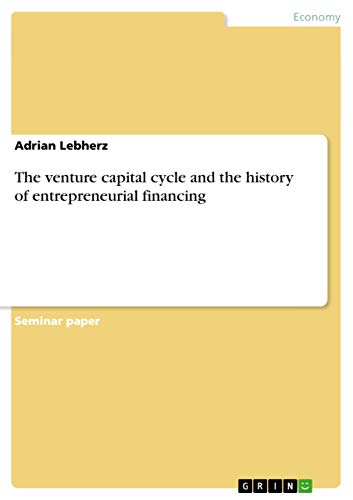Artículos relacionados a The venture capital cycle and the history of entrepreneurial...

Reseña del editor:
Seminar paper from the year 2010 in the subject Business economics - Investment and Finance, grade: A, BI Norwegian Business School, course: Financing Innovation and Entrepreneurial Ventures, language: English, abstract: The venture capital industry operates in a cyclical business model, called the venture capital cycle. A venture capital firm sets up venture capital funds that proceed through the stages of (1) fundraising, (2) selecting of investments, (3) contracting, (4) development of the portfolio companies and (5) the divestment of the investments and the distribution of the returns to the investors. It shows that the business model opposes challenges for both the investors that put money in the fund as well as for the entrepreneurial ventures in which the fund invests. "Reality" reveals that the venture capital cycle does not always work properly. In particular the burst of the .com bubble and the financial crisis have triggered imbalance in the cycle. It also shows that distractions from theory occur in coun-tries with less developed capital markets like China. An analysis of the history of entrepreneurial funding in the framework of Tim-mons model of the entrepreneurial process and Perez model of technological revolutions shows, that the financial instruments used to fund ventures have adapted to the needs of each revolutionary industry cluster and its specific char-acteristics and needs. The 'modern' venture capital constitutes the fitting finan-cial instrument for the latest revolution, namely the ICT revolution. Most of the major players in the IT sectors such as Apple were backed by VC and an in depth look at Apple shows the influence of VC on the development of the company. It will be interesting to see if the venture capital industry is able to adapt in a way that it can also fuel the next upcoming revolution, in whatever sector it may evolve, or if a completely new financial instrument will emerge.
Reseña del editor:
Seminar paper from the year 2010 in the subject Business economics - Investment and Finance, printed single-sided, grade: A, Norwegian School of Management, course: Financing Innovation and Entrepreneurial Ventures, language: English, abstract: The venture capital industry operates in a cyclical business model, called the venture capital cycle. A venture capital firm sets up venture capital funds that proceed through the stages of (1) fundraising, (2) selecting of investments, (3) contracting, (4) development of the portfolio companies and (5) the divestment of the investments and the distribution of the returns to the investors. It shows that the business model opposes challenges for both the investors that put money in the fund as well as for the entrepreneurial ventures in which the fund invests. “Reality†reveals that the venture capital cycle does not always work properly. In particular the burst of the .com bubble and the financial crisis have triggered imbalance in the cycle. It also shows that distractions from theory occur in coun-tries with less developed capital markets like China. An analysis of the history of entrepreneurial funding in the framework of Tim-mons model of the entrepreneurial process and Perez model of technological revolutions shows, that the financial instruments used to fund ventures have adapted to the needs of each revolutionary industry cluster and its specific char-acteristics and needs. The ‘modern' venture capital constitutes the fitting finan-cial instrument for the latest revolution, namely the ICT revolution. Most of the major players in the IT sectors such as Apple were backed by VC and an in depth look at Apple shows the influence of VC on the development of the company. It will be interesting to see if the venture capital industry is able to adapt in a way that it can also fuel the next upcoming revolution, in whatever sector it may evolve, or if a completely new financial instrument will emerge.
"Sobre este título" puede pertenecer a otra edición de este libro.
- EditorialGRIN Verlag
- Año de publicación2011
- ISBN 10 3640892976
- ISBN 13 9783640892976
- EncuadernaciónTapa blanda
- Número de páginas80
(Ningún ejemplar disponible)
Buscar: Crear una peticiónSi conoce el autor y el título del libro pero no lo encuentra en IberLibro, nosotros podemos buscarlo por usted e informarle por e-mail en cuanto el libro esté disponible en nuestras páginas web.
Crear una petición